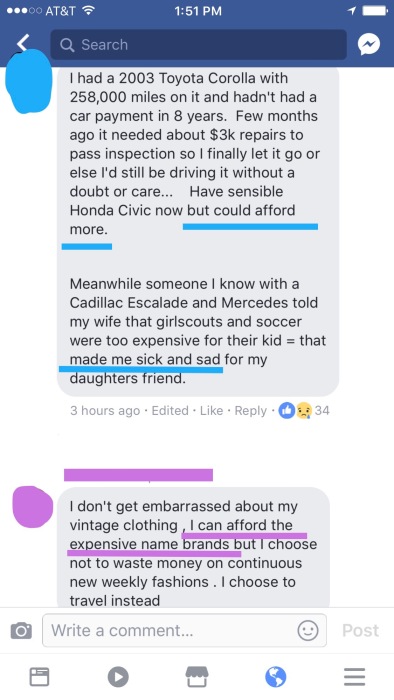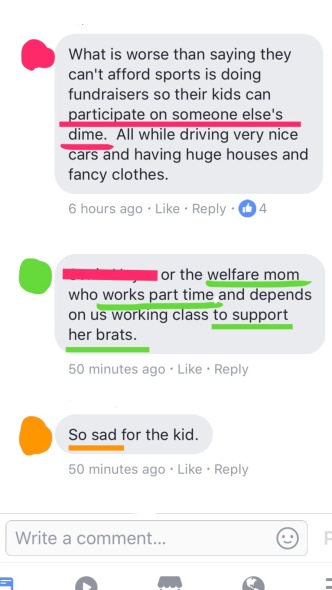A constant criticism of Minimalism is that it is a philosophy that is only for the privileged and is anti-poor. This is a criticism The Minimalists, Josh and Ryan, respond to regularly. As someone who has volunteered in Legal Aid’s intake department and the Guardian ad Litem program in my short legal career, I have immense sympathy for those of lower socioeconomic status and have used my position of relative privilege for their benefit. It truly hurts for people to suggest I identify with a group that doesn’t.
I’m willing to accept the constructive criticism and admit that there are aspects that may seem quite privileged and many of the practitioners of minimalism tend to be quite privileged people. Indeed, I admit that I am a relatively privileged person. All the discussion by minimalists of cars and vacations might make it seem like minimalism doesn’t have any application to the lives of lower-income people. With many minimalist commentators (and minimalism’s adherents) maintaining such a focus on the decluttering process, those that don’t have much in the first place might tune out the larger message.
I explained that most of the things I got rid of during the decluttering process were not things I purchased in the first place, due in large part to my mom’s job working closely with people in their homes who give her things they no longer want. Most of the things I got rid of that I purchased for myself were old enough I felt like I “got my money’s worth.” It would have been much harder for me to get rid of so much had I actually paid my hard-earned money to purchase all of it. As it is, it was hard not to mentally tally up the dollar figures as I made trip after trip to the thrift store with a car full of items, many of which I had paid for myself, some of which I had not.
That’s not to say I agree with everything anyone who identifies as a minimalist says. The Becoming Minimalist Facebook page posted the following article. The article, about overcoming embarrassment about old cars/small houses, etc. was very similar in tone to my previous article that discussed how avoiding the pressures from others was an important part of the minimalist journey for me. The comment section of the Becoming Minimalist article revealed some disgusting, unchecked privilege that made me uncomfortable.


Many of the commenters felt the need to point out that they were able to afford better than what they had. This misses the point because they are still in the toxic mindset of competing with others—only now they are competing to see who has the least stuff/oldest car/oldest clothes/etc. It just changes who they look down their nose at and why. One of the reasons I find minimalism so freeing is that it releases us from the expectations of others. I don’t have to worry about the boy who said my car was too old, or those who said my ring was too small. My car is good enough for me. My ring is good enough for me. Their opinions don’t matter. It is my life and, at the end of the day, I am the only one (besides arguably my husband) who must live with and approve of my financial and other life decisions.
It also buys into the cultural narrative that there is some virtue inherent in being “able to afford” expensive things. These commenters feel the need to draw a distinction between themselves, who obviously has an older car because they are way more enlightened than everyone else and the person who has an older car because they *gasp* have no job/bad credit/can’t afford a car payment right now/etc., lest anyone think they are the latter.
Having lots of money is not a virtue and not having much money is not a moral failing. Many people, especially in America, believe differently, as evidenced by the many Trump supporters that state in interviews some permutation of the following: “He’s worth a billion dollars. He must be pretty smart.” Regardless of my personal political views, I don’t believe there is any correlation between a person’s net worth and their intelligence or morality. If you don’t believe me, consider the example of such miserable, morally repugnant people as Mother Teresa and Gandhi. (Obvious sarcasm here).
That doesn’t mean rich people are inherently evil, either. Consider people like Bill and Melinda Gates, who used their wealth and fame to create a charity that, among other things, tackles global health issues like malaria and HIV. It’s not their wealth that makes Bill and Melinda Gates morally admirable people, it’s what they choose to do with it. On the other hand, living some sort of extreme minimalist lifestyle, depriving myself and my family for the sake of deprivation does not make me happier or morally superior, either. But if my minimalist lifestyle allows me to donate money to worthy causes, take a lower paying public interest job, or volunteer time to those less fortunate, that’s what counts.
I don’t have to get a new car (and a new car payment) every 2 years because I don’t care if you think my car is old or whether you think I can’t afford a newer one. Having a newer car doesn’t make me a happier or morally superior person. The main benefit of minimalism is realizing there’s no correlation one way or the other. You will cease to be impressed by the things people have and will be more impressed by the things people do.
Privilege is not something someone should feel guilty about. It is something that lower classes need to achieve on their own, not as a handout.
LikeLike
i agree on your first sentence. but not so much on the last one. those “lower classes” probably can’t find their way out, or do you think they enjoy to live in debt?
the problem here is the system, that creates mazes inside of mazes so people are caught up and instead of freeing themselves, they enter a new, more profound layer of crap.
i know what i’m talking about, i came form a “medium class” family, and fell in love with a “low class” boy. i chose to adopt his lifestyle, even if it meant having only money for the necessities. but it would also mean i’d receive love. something that money can’t buy and it wasn’t provided on my own family.
from 13 years of being together, i realized how difficult it was for him and his parents, and now me, to find a way out. we work hard, but our paychecks don’t go accordingly. the bills are bigger and bigger, and when we can’t pay them, we have to recur to credit. and then the credit goes bigger, and bigger and it doesn’t seem to have an end. it gets overwhelming.
what i mean is: privilege isn’t something that people needs to earn. privilege shouldn’t even exist. what needs to exist is a better system. not governments, and brands, and society putting us on mazes and rat races.
oh, and hierarchy? as low class, high class, we really need to stop using those terms. we live in an ecosystem, everyone is equal. there are no hierarchies on nature.
LikeLiked by 1 person
“lower classes” probably can’t find their way out”
There may be some validity in that. There is so much propaganda about racism that many believe it is impossible. That is part of the problem. The Democrats and the Left seem consumed with selling minorities about all the obstacles they supposedly face. But I can tell you as a fact that my company would love to hire qualified minorities. It is sometimes a supply problem.
“the problem here is the system, that creates mazes inside of mazes”
Again there is truth in this. There are so many competing interests trying to modify the system to benefit their interest. Big business often wants to import cheap foreign labor as just one example.
“privilege shouldn’t even exist”
But it will, and I don’t necessarily agree with “shouldn’t”. The problem is when one can’t move up to a higher level of “privilege” (wealth). The problem isn’t that some people are born in a family with more wealth, etc. The problem is when there are barriers to moving up.
There used to be a saying back in the 19th century: “From shirtsleeves to shirtsleeves in three generations.” Here is what is meant.
With a lot of freedom a person could create a business and make a lot of money. They started off as a worker in shirtsleeves but went to riches as their business and innovation succeeded. They died and left their fortune to their children who, lacking the drive and competency of the first generation, spent the money leaving their children back in poverty, back into working in their shirtsleeves.
What we have is a system that tries to protect the heirs in the above scenario from losing their wealth. We have policies that give big companies major advantages over small business competitors. Believe it or not a lot of big companies are in favor of major regulations that they can deal with, but their smaller rivals have a hard time dealing with.
What we really need is a truly free market where the biggies can’t get those kind of favors.
” we really need to stop using those terms. we live in an ecosystem, everyone is equal”
We do need a system where everyone is equal in opportunity to move up. I call that system free markets, a system where individuals are free to take their skills and ambitions as far as they go and which doesn’t protect large, established businesses.
In a truly free system there will be inequality, but it will be an inequality based on ambition and skill, not political pull.
LikeLiked by 2 people
i like your take on minimalism! i’m so tired of seeing competition: how many clothes you have, how many decluttering you’ve made, how old is your car, etc.
minimalism, for me, is something more. it is using our resources the best way possible. that’s why i started dissociating with this movement {that is going to paths i don’t identify with}, and pursue a simple life instead. if you’d like to know in more detail about what i thing just read my post called “the unwise side of minimalism” on my blog. thank you. ❤
LikeLiked by 1 person
Thanks! I’ll definitely check it out!
LikeLiked by 1 person
Pingback: Is Minimalism a Cult? | Legally Minimalist
Pingback: Weekly Update: Week 16 | Legally Minimalist
Pingback: Choosing Minimalism | Legally Minimalist
Pingback: The Importance of Defining Priorities | Legally Minimalist
Pingback: Watches | Legally Minimalist
Pingback: How to be a Minimalist | Legally Minimalist
Pingback: Ego | Legally Minimalist